Femininjas
Back in 2011, as newly minted high schoolers at Gann Academy in Waltham, Kineret Grant-Sasson and Mitali Desai had an idea: during the second half of freshman year, they would start holding meetings for a feminist club, welcoming students with all levels of knowledge and interest. Today, Kineret and Mitali are incoming seniors, and their club, Feminijas, is going strong. Femininjas meets Mondays at lunch for discussions about gender, power, and feminism, topics many students don’t study in earnest until well into college. Recently, they embarked on a photo project, something they’d seen online and thought would be an empowering exercise for Femininjas. The concept was simple: pass around a white dry-erase board, ask participants to write a blurb about why they need feminism, and take a picture. The results are powerful, encouraging, and thought-provoking.
I talked to Kineret about Femininjas, the photo project, and what it means to identify as a feminist in high school.
“It was a joint idea—a dream—to start Femininjas. Gann [our school] had nothing like it. Halfway through freshman year, we started having meetings, and 25 or 30 people came to our first meeting.
Now, it’s a great group of people, and about one-third are boys. Anywhere between 15 to 50 people attend meetings.
My parents are both strong feminists. I’ve always considered myself a feminist. I grew up in a really liberal environment, with a lot of female rabbi (family) friends. My 13- year-old brother already calls himself a feminist.
Last year was a smaller group, so we had discussions every week about current events, articles, or videos that club members bring in. We also have a Facebook page that people post to all the time, so we talk about what’s on our Facebook. This year we started by showing the movie Miss Representation, which is about women in the media, and how negative portrayals impact society. Sometimes we have debates. After the “Blurred Lines” scandal, we had a meeting called “Miley Cyrus, Robin Thicke, and Social Responsibility.” We talked about the responsibility of celebrities and how race, gender, and class impacts how the public treats them.
Oxford University did this photo project, and I kept seeing stories online about it. I think it’s important to talk about these things. It’s through discussion that people become aware of these issues—a lot of it is internalized sexism, so once you talk about it you can recognize it in yourself.
A lot of people showed up to participate in the photo project. Teachers also got involved. The climate at my high school is very liberal, and the teachers are overwhelmingly progressive. There’s a significant community of Orthodox feminists, which is really cool.
Still though, there’s definitely a culture of the classic, “I’m not a feminist, I’m pro-equality,” “I support feminism but I’m not a feminist.” I personally identify as a feminist. I struggle with what to say to people who don’t want to use that label. I try to explain to them that feminism is advocacy for social, economic, and political equality of the sexes. People often don’t know that, and if I say that I think it helps a lot.
One of the goals of Femininjas this year was to reclaim the word feminism. I’ve always considered myself a feminist, but I only began calling myself a feminist about two years ago. For some reason, it’s scary to people. I think it’s really powerful to declare that you’re a feminist, even to yourself. And I think if people aren’t using that word it’s a big loss to the history of feminism. If it has negative connotations, it’s a function of the word being misunderstood, not the reality of the situation.
I read How to Be A Woman by Caitlin Moran, which is the funniest book I’ve ever read and totally changed my life. In the book she says she woke up every morning and said, “I am a strident feminist!” which I thought was so awesome. I started doing that every morning, and it was so powerful. I told people in Femininjas to do it too. I highly recommend that.
Next year, I’m hoping to do a program for freshmen about gender issues. There are members of the club who are absolutely brilliant, and so much better read than I am. It’s educational for me, too. We all learn from each other.


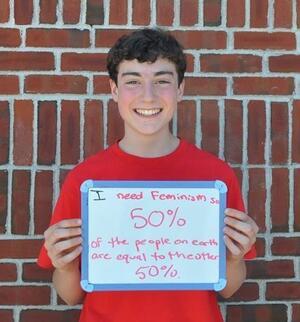
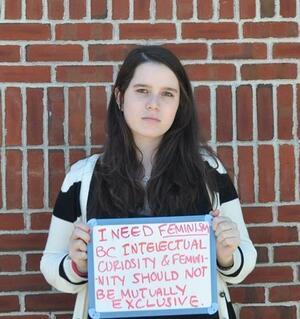
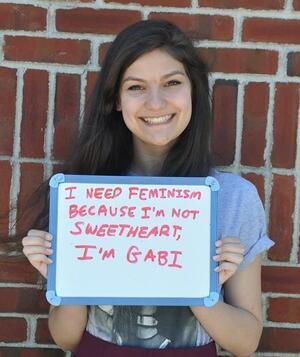
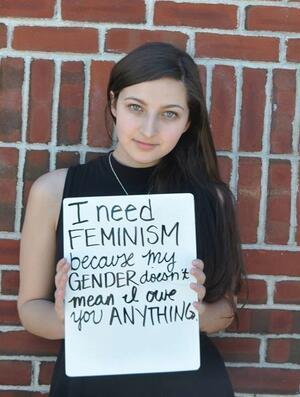
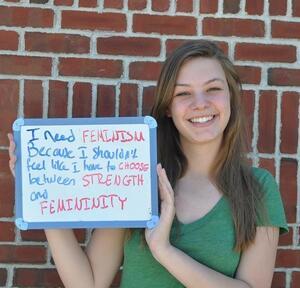





What inspiring young women and men!!! Kineret is going to transform the world around her!
I am a feminist from the '60s - and I am SO SO thrilled to read that feminism is not dead! My grandmother was a Dr. in Russia, a suffragette in the US, and my mother was one of the first women lawyers in the 30's. I cheer on all these young women who are proud to be called FEMINISTS...welcome - we need more of you!! :)
This is a great article, thank you!
In reply to <p>This is a great article, by Akiva
Thanks Akiva!!
More Jewish high schools need to have feminist groups! This is awesome.
In reply to <p>More Jewish high schools by Talia bat Pessi
Agreed. Strongly.